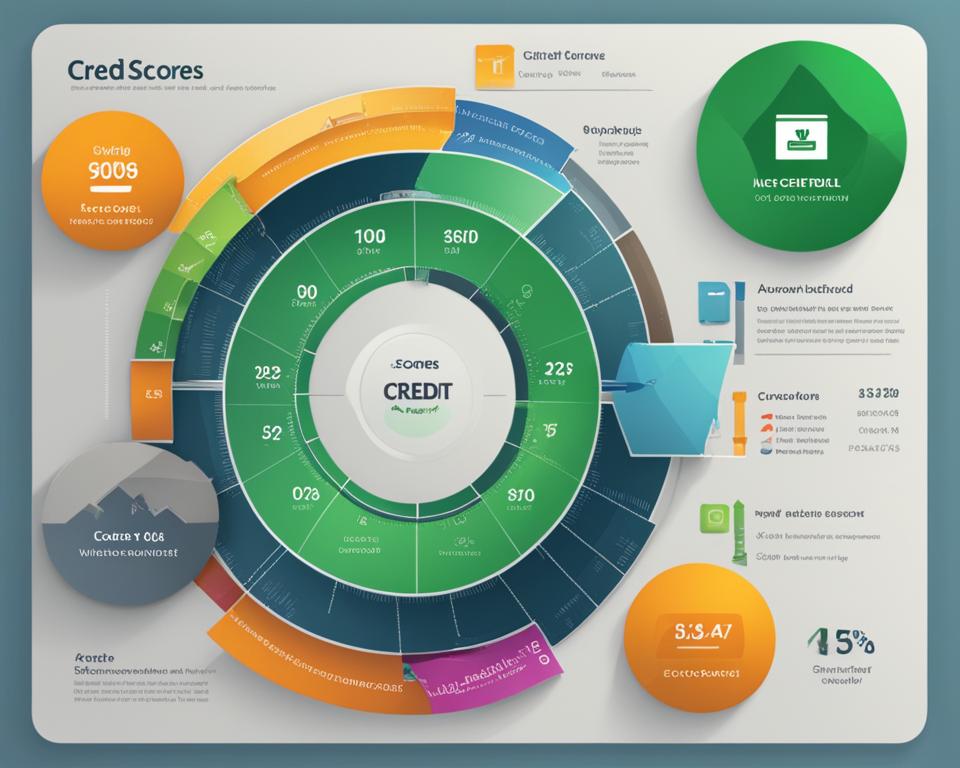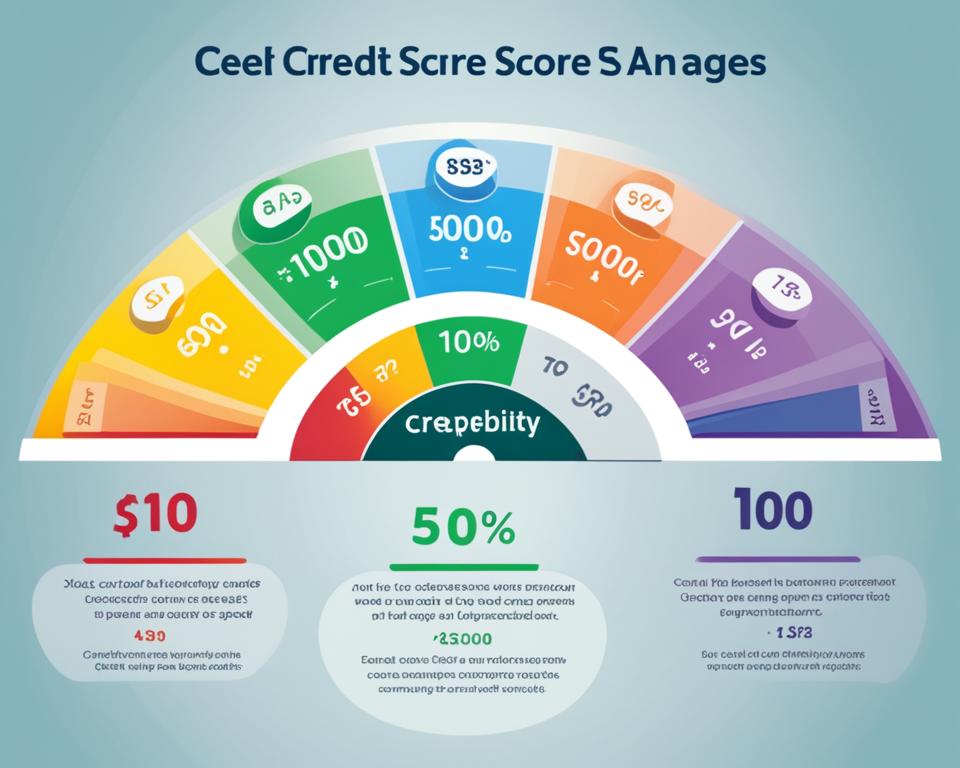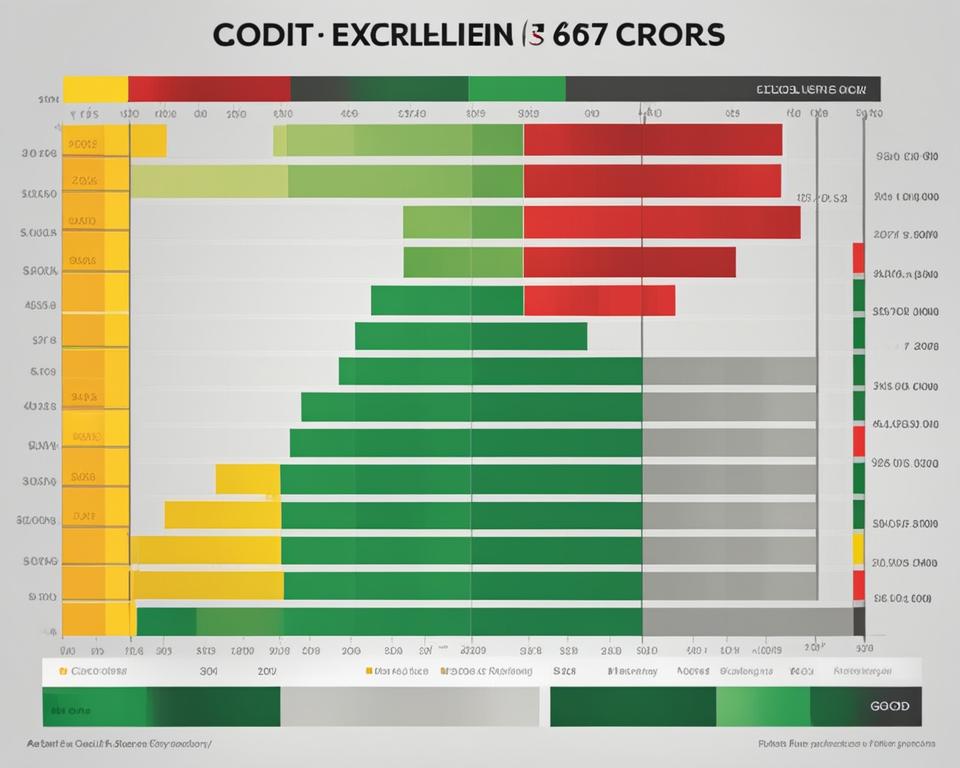Understanding what credit score is considered good is crucial for managing your financial health. A credit score is a numerical representation of an individual’s creditworthiness, indicating how likely they are to repay their debts on time. Lenders and financial institutions use credit scores to assess the risk of lending to someone.
Generally, for a credit score with a range between 300 and 850, a score of 700 or above is considered good, while a score of 800 or above is considered excellent. These scores demonstrate responsible credit management and a lower risk of defaulting on payments.
Having a good credit score is important because it can help you qualify for credit cards and loans with lower interest rates and better terms. With a higher credit score, you’ll have more financial opportunities and greater flexibility when it comes to borrowing money.
Improving your credit score is possible with the right strategies and habits. By paying your bills on time, keeping your credit utilization low, and maintaining a diverse mix of credit accounts, you can gradually raise your credit score over time.
Key Takeaways:
- A credit score of 700 or above is generally considered good, while a score of 800 or above is considered excellent.
- A good credit score can help you qualify for credit cards and loans with better terms and lower interest rates.
- Improving your credit score involves paying bills on time, keeping credit utilization low, and maintaining a diverse mix of credit accounts.
- Understanding credit score ranges and the factors that impact scores can help you make informed financial decisions.
- Regularly monitoring your credit score can help you track your progress and detect any errors or fraudulent activities.
What Is a Good FICO® Score?
When it comes to credit scores, a good FICO score plays a crucial role in your financial well-being. FICO credit scores, developed by the Fair Isaac Corporation, are widely used by lenders and creditors to assess your creditworthiness.
So, what exactly is considered a good FICO score? Well, the base FICO Scores range from 300 to 850, with higher scores indicating better creditworthiness. For a good credit score, you generally want to aim for a range between 670 and 739 within that 300 to 850 range.
It’s important to note that FICO also creates industry-specific credit scores to cater to the specific needs of credit card issuers and auto lenders. These industry-specific FICO Scores have their own scoring ranges, different from the base FICO Scores.
For a good industry-specific FICO Score, you’ll typically want to fall within the range of 670 to 739. However, it’s worth mentioning that industry-specific credit scores can have different scoring ranges altogether. In fact, the range for these industry-specific credit scores can vary from 250 to 900.
Understanding what constitutes a good FICO score is important as it can impact your ability to qualify for credit cards, loans, and favorable interest rates. A good credit score not only reflects your creditworthiness but also opens up opportunities for better financial prospects.
| Score Range | Credit Rating |
|---|---|
| 300-579 | Poor |
| 580-669 | Fair |
| 670-739 | Good |
| 740-799 | Very Good |
| 800-850 | Exceptional |
As you can see from the table above, a good FICO score falls within the range of 670 to 739, while scores below 670 may be considered fair or even poor depending on the specific scoring model used by lenders.
Now that you have a better understanding of what constitutesa good FICO score, it’s important to strive towards achieving and maintaining a positive credit history. This can be done by making timely payments, keeping your credit utilization low, and being responsible with your financial obligations.
The Impact of a Good FICO Score
“Having a good FICO score not only improves your chances of getting approved for credit but also allows you to enjoy lower interest rates and better loan terms.”
With a good FICO score, you can have access to a wider range of financial products and services, including credit cards, mortgages, and auto loans. Lenders view individuals with good credit scores as less risky borrowers, making them more inclined to offer competitive rates and favorable terms.
Having a good FICO score can save you thousands of dollars in interest payments over the life of a loan, making it a crucial factor in achieving your financial goals.
What Is a Good VantageScore?
When it comes to VantageScore credit scoring models, a good VantageScore falls within the range of 661 to 780. This applies to VantageScore 3.0 and 4.0, the two newest credit scoring models offered by VantageScore. It’s important to note that these models use the same 300 to 850 range as the base FICO Scores, providing consistency in credit evaluation.
The VantageScore credit scores play a crucial role in determining an individual’s creditworthiness. Lenders and creditors utilize these scores to assess the likelihood of an individual repaying their debts responsibly. With a good VantageScore, individuals have a higher chance of qualifying for credit cards, loans, and favorable interest rates.

VantageScore’s commitment to providing reliable credit scoring models empowers both consumers and lenders to make informed financial decisions. By understanding what constitutes a good VantageScore, individuals can take proactive steps to improve their creditworthiness and secure better financial opportunities.
“A good VantageScore range, between 661 and 780, showcases a strong credit profile, increasing the likelihood of approval for loans and credit cards with favorable terms and conditions.”
| VantageScore Credit Scoring Models | Score Range |
|---|---|
| VantageScore 3.0 | 661-780 |
| VantageScore 4.0 | 661-780 |
Understanding the nuances of credit scoring models like VantageScore enables individuals to make strategic financial decisions that positively impact their credit profiles. By consistently working towards maintaining a good VantageScore, individuals can unlock a world of financial possibilities and achieve their goals.
What Is a Good Credit Score to Buy a House?
When it comes to buying a house, having a good credit score can make all the difference. Your credit score is one of the primary factors lenders consider when determining your eligibility for a mortgage. A good credit score not only increases your chances of approval, but it can also help you secure a lower interest rate, potentially saving you thousands of dollars over the life of your loan.
The minimum credit score required to buy a house can vary depending on the type of mortgage you’re applying for. Here’s a breakdown of the credit score requirements for different types of mortgages:
- Conventional Mortgages: To qualify for a conventional mortgage, which is a loan not insured or guaranteed by the government, you typically need a minimum credit score of 620. However, keep in mind that a higher credit score may be required to qualify for the best interest rates and terms.
- FHA Home Loans: The Federal Housing Administration (FHA) offers loans with more flexible requirements, making homeownership more accessible to borrowers who may have lower credit scores. With an FHA loan, you may be able to qualify with a credit score of as low as 500, but a larger down payment is generally required for scores below 580.
- VA Loans: If you’re a veteran or active-duty service member, VA loans provided by the U.S. Department of Veterans Affairs offer competitive interest rates and more lenient credit requirements. While the VA itself does not set a minimum credit score requirement, most lenders typically look for a credit score of 620 or higher.
- USDA Loans: The U.S. Department of Agriculture (USDA) offers loans for rural and suburban homebuyers through its Rural Development Program. Like VA loans, the USDA does not establish a minimum credit score requirement, but most lenders require a score of at least 640.
It’s important to note that credit score requirements may vary between lenders, and some lenders may have additional criteria beyond credit score alone. As you prepare to buy a house, it’s wise to check with multiple lenders to find the one that offers the best terms based on your unique credit profile.
Remember, having a good credit score to buy a house not only improves your chances of approval but can also save you money in the long run. So, make it a priority to maintain a good credit score by paying your bills on time, keeping your credit card balances low, and avoiding any negative credit activity.
Image:
What Is a Good Credit Score to Buy a Car?
While there is no official minimum credit score required to buy a car, having a credit score of 670 or higher is generally considered good. A good credit score can open doors to better auto loan terms and lower interest rates, saving you money in the long run.
When you have a good credit score, lenders view you as less of a risk, increasing your chances of loan approval. This means you’ll have access to more favorable loan terms, such as lower interest rates and more flexible repayment options. On the other hand, if your credit score is lower, lenders may consider you a higher risk and offer less favorable loan terms or even deny your application altogether.
It’s important to note that some types of car loans, such as FHA home loans, may have specific credit score requirements. In these cases, a good credit score may be necessary to qualify for the loan.
Ultimately, maintaining a good credit score is crucial if you’re planning to buy a car. It’s a key factor that lenders consider when determining your eligibility for an auto loan and the terms they offer. By focusing on building and maintaining good credit, you can increase your chances of getting approved for a car loan with favorable terms and lower interest rates.

Note: The image above is used for illustrative purposes and does not directly represent the topic of this section.
| Minimum Credit Score | Loan Terms | Interest Rates |
|---|---|---|
| Below 670 | May face difficulty in loan approval | Higher interest rates |
| 670 and above | Higher chances of loan approval | Lower interest rates |
Factors That Affect Your Credit Scores
Several factors can impact your credit scores, including payment history, credit utilization, length of credit history, types of accounts, and recent activity. These factors play a crucial role in determining your creditworthiness and financial stability.
Payment History
Your payment history is one of the most significant factors that affect your credit scores. It reflects whether you make your payments on time or have a history of late payments or defaults. Lenders and creditors look for a consistent track record of responsible payment behavior.
Credit Utilization
Credit utilization refers to the amount of available credit you are using. It is calculated by dividing your total credit card balances by your total credit limits. A lower credit utilization ratio is generally considered favorable for your credit scores. Keeping your credit card balances low and managing credit wisely can positively impact your scores.
Length of Credit History
The length of your credit history is another influential factor in determining your credit scores. It considers how long you have held credit accounts, including the age of your oldest account, your average account age, and the age of your newest account. Establishing a long credit history demonstrates your ability to manage credit over time.
Types of Accounts
The types of accounts you have can influence your credit scores. Lenders prefer to see a healthy mix of different types of credit, such as credit cards, installment loans, and mortgages. Managing a diverse range of credit responsibly shows your ability to handle various financial obligations.
Recent Activity
Your recent credit activity also plays a role in your credit scores. Opening new accounts, applying for loans, and making multiple credit inquiries within a short period can have a temporary negative impact. It is important to be mindful of your credit applications and inquiries to maintain a stable credit profile.
By understanding these factors and their impact on your credit scores, you can take proactive steps to improve your creditworthiness and maintain a healthy financial standing.
| Factors | Influence |
|---|---|
| Payment History | High |
| Credit Utilization | High |
| Length of Credit History | Medium |
| Types of Accounts | Medium |
| Recent Activity | Low |
Factors That Credit Scores Do Not Consider
Credit scores are a vital tool used by lenders to assess an individual’s creditworthiness. However, it’s important to note that credit scores do not consider certain factors. These factors, including race, age, salary, occupation, and personal information, are not taken into account when calculating credit scores.
Under U.S. law, credit scores are designed to be fair and unbiased, ensuring equal opportunities for individuals from all backgrounds. Therefore, credit scoring models strictly exclude any information related to race, age, or personal characteristics that could contribute to discrimination in lending practices.
While credit scores do not directly account for factors like salary or occupation, these may still have an impact on the approval decisions made by lenders. For example, when determining whether to approve a loan or credit application, lenders may consider an applicant’s income or employment stability to assess their ability to repay the debt.
“Credit scores are valuable tools in lending decisions, providing lenders with an objective assessment of an individual’s creditworthiness. By excluding factors such as race, age, salary, occupation, and personal information, credit scores aim to ensure fairness and equal opportunities in the credit market.”
It is worth noting that while credit scores themselves do not include these factors, some demographic information may indirectly influence credit profiles. For instance, factors like the length of credit history or credit utilization may be impacted by an individual’s age or personal circumstances. However, the credit scoring models do not explicitly consider these factors in their calculations.
Ultimately, credit scores provide lenders with a standardized assessment of an individual’s credit history and financial behavior, enabling them to make well-informed lending decisions. By focusing on factors such as payment history, credit utilization, length of credit history, types of accounts, and recent activity, credit scores offer a fair evaluation of an individual’s creditworthiness.
It’s important to remember that anyone can take steps to improve their credit score, regardless of their demographic or personal information. By practicing good credit habits, such as making timely payments, keeping credit card balances low, and maintaining a diverse mix of credit accounts, individuals can work towards achieving a better credit score and enjoying the benefits that come with it.

In summary, credit scores do not consider factors such as race, age, salary, occupation, and personal information. By excluding these factors, credit scoring models aim to provide a fair and unbiased evaluation of an individual’s creditworthiness. While other factors may indirectly influence credit profiles, credit scores focus on objective criteria related to an individual’s financial behavior. By understanding the factors that credit scores do not consider, individuals can work towards improving their credit and accessing better credit opportunities.
Why There Are Different Credit Scores
Different credit scoring models exist to cater to the needs of lenders and creditors who rely on credit scores to make informed lending decisions. Companies like FICO and VantageScore have developed various scoring models with unique algorithms and credit score ranges to meet the specific requirements of different lenders and industries. These models take into account different factors and data points when calculating credit scores, resulting in variations in the scores provided.
For instance, the FICO score is one of the most widely recognized credit scores and is used by many lenders. It is based on the information provided by the three major credit bureaus – Equifax, Experian, and TransUnion. On the other hand, VantageScore is another popular credit scoring model that uses a different set of criteria to determine creditworthiness.
In addition to general credit scores, industry-specific credit scores are also utilized by lenders in certain sectors. These scores are tailored to evaluate creditworthiness within specific industries, such as credit card issuers and auto lenders. By using industry-specific credit scores, lenders can have a more accurate assessment of an individual’s creditworthiness within their specific field.
Having different credit scoring models allows lenders to have a comprehensive view of an individual’s creditworthiness and make lending decisions that align with their specific lending criteria. It also provides borrowers with different credit score options, allowing them to understand how different lenders may assess their creditworthiness based on varying scoring models.
Key Points:
- Different credit scoring models exist to meet the specific needs of lenders and industries.
- Popular credit scoring models include FICO and VantageScore.
- Industry-specific credit scores offer a tailored assessment of creditworthiness within specific sectors.
- Having different credit scoring models provides lenders with comprehensive information for lending decisions.
Credit Score Ranges
Understanding credit score ranges is crucial for assessing your financial health. In the United States, two widely recognized credit scoring systems are the FICO scores and VantageScore.
FICO Score Ranges
The FICO scores range from 300 to 850, with higher scores indicating better creditworthiness. Here are the credit score ranges according to FICO:
| Score Range | Credit Rating |
|---|---|
| 800 – 850 | Exceptional |
| 740 – 799 | Very Good |
| 670 – 739 | Good |
| 580 – 669 | Fair |
| 300 – 579 | Poor |
Having a good or excellent FICO score can help you qualify for loans and credit cards with favorable terms and interest rates.
VantageScore Ranges
VantageScore also uses a range of 300 to 850, similar to FICO scores. Here are the credit score ranges according to VantageScore:
| Score Range | Credit Rating |
|---|---|
| 781 – 850 | Superprime |
| 661 – 780 | Prime |
| 601 – 660 | Near Prime |
| 500 – 600 | Subprime |
| 300 – 499 | Deep Subprime |
Similar to FICO scores, having a good or superprime VantageScore can increase your chances of getting approved for credit and loans at competitive rates.
Remember, these ranges serve as general guidelines and may vary slightly depending on the lender or the scoring model they use. However, maintaining a good credit score within these ranges is beneficial for your financial well-being.

How to Improve Your Credit
To improve your credit score and enhance your financial standing, it’s important to focus on several key factors. By taking proactive steps, you can boost your creditworthiness and increase your chances of securing favorable loan terms and interest rates.
Paying Bills on Time
The first step towards improving your credit is to consistently pay your bills on time. Late payments can negatively impact your credit score and signal to lenders that you may be unreliable or have difficulty managing your finances. Set up automatic payments or reminders to ensure that you never miss a due date and demonstrate your commitment to financial responsibility.
Reducing Credit Card Balances
High credit card balances can increase your credit utilization ratio, which is the percentage of available credit that you’re currently using. Dedicating efforts to reducing these balances can have a significant positive impact on your credit score. Aim to keep your credit utilization below 30% to show lenders that you are responsible with credit and can manage your debt effectively.
Credit Utilization and Credit Mix
Aside from reducing credit card balances, it’s crucial to maintain a healthy credit utilization ratio. This means controlling the amount of credit you utilize compared to the total credit available to you. Furthermore, having a mix of different types of credit accounts, such as credit cards, loans, and mortgages, can demonstrate your ability to handle various financial obligations. A diverse credit mix can contribute to a higher credit score and enhance your creditworthiness.
Remember, achieving an excellent credit score requires consistent effort and responsible financial management.
Regularly Checking Your Credit Reports
Regularly checking your credit reports is essential for identifying any errors or inaccuracies. Mistakes on your credit report can negatively impact your credit score and hinder your financial progress. By reviewing your credit report, you can dispute any inaccuracies and ensure that your credit profile is accurate and up to date. This proactive approach can help protect your credit and allow you to take corrective action when necessary.
Improving your credit score is a gradual process that requires commitment and discipline. By implementing these strategies and maintaining good financial habits, you can gradually improve your creditworthiness and enjoy the benefits of a higher credit score.
In the next section, we will explore the importance of credit score monitoring and checking, and how these practices can help you maintain a healthy credit profile.
Credit Score Monitoring and Checking
Monitoring and regularly checking your credit score is an important part of managing your financial health. By staying informed about your credit standing, you can make better financial decisions and take control of your creditworthiness. Here are some key points to consider when it comes to credit score monitoring and checking:
Checking Your Credit Score
Checking your credit score allows you to stay updated on your creditworthiness. You can access your credit score for free through personal finance websites and banking apps that offer credit score services. These platforms provide convenient ways to access your credit score and monitor any changes over time.
When checking your credit score, it’s important to keep in mind that there are different credit scoring models used by lenders and creditors. The most widely recognized credit scores are provided by FICO and VantageScore, but other industry-specific credit scores may also be used. Checking your FICO Score and VantageScore can give you a comprehensive view of your credit standing.
Monitoring Your Credit Report
In addition to checking your credit score, regularly monitoring your credit report is equally crucial. Your credit report contains detailed information about your credit history, including your payment history, credit utilization, account balances, and any negative information such as late payments or accounts in collections.
Monitoring your credit report allows you to spot any errors, inaccuracies, or fraudulent activities that could potentially lower your credit score. By identifying and addressing these issues promptly, you can protect your creditworthiness and ensure that your credit information is accurate.
“Regularly checking your credit reports can help you detect any errors or fraudulent activities.”
Under federal law, you are entitled to a free copy of your credit report from each of the three major credit bureaus (Equifax, Experian, and TransUnion) every 12 months. You can request your credit reports online or through mail, and it’s recommended to review them at least once a year.
Freezing Your Credit
If you want to take an extra step to protect your credit information, you have the option to freeze your credit. A credit freeze restricts access to your credit report, making it more challenging for identity thieves to open new accounts or obtain credit in your name without your knowledge.
To freeze your credit, you need to contact each of the three credit bureaus individually and request a credit freeze. They will provide you with a unique PIN or password that you can use to lift the freeze temporarily if you need to apply for new credit.
It’s important to note that freezing your credit does not impact your credit score in any way. It simply adds an extra layer of security to prevent unauthorized access to your credit information.
Overall, checking and monitoring your credit score and credit report are essential practices for maintaining good credit health. By staying informed and proactive, you can protect yourself against potential credit issues and take the necessary steps to improve your credit standing.
The Impact of Credit Scores
Credit scores play a crucial role in shaping various aspects of your financial life. They have a significant impact on your ability to secure loans and credit cards, the interest rates you receive, and your overall creditworthiness. Maintaining a good credit score is crucial for accessing better credit options and securing favorable terms.
When you apply for a loan or credit card, lenders assess your credit score to determine your creditworthiness. A higher credit score increases your chances of approval and often leads to more favorable loan terms. On the other hand, a lower credit score may result in either rejection or higher interest rates, signifying a higher level of risk for lenders.
Interest rates are directly affected by credit scores. With a good credit score, you are more likely to be offered lower interest rates. This means you’ll end up paying less in interest over the life of a loan or when carrying a credit card balance. A higher credit score shows lenders that you have a history of managing credit responsibly, making you a less risky borrower.
Moreover, credit scores are not only important for loan and credit card applications. They can also impact other areas of your financial life, such as securing favorable insurance premiums and even determining whether you qualify to rent a home or apartment. Landlords and insurance companies often use credit scores to assess an individual’s financial responsibility and reliability.
“Maintaining a good credit score is crucial for accessing better credit options and securing favorable terms.”
Factors Affecting Interest Rates
To further illustrate how credit scores impact interest rates, consider the following hypothetical scenario:
| Credit Score Range | Interest Rate |
|---|---|
| Excellent (760-850) | 3.50% |
| Good (700-759) | 4.25% |
| Fair (640-699) | 5.75% |
| Poor (300-639) | 9.50% |
In the above example, a borrower with an excellent credit score would qualify for a significantly lower interest rate compared to someone with a poor credit score. Over the life of a long-term loan, such as a mortgage, the difference in interest rates can result in substantial savings. It’s essential to note that the specific ranges and interest rates may vary based on factors such as the lender and loan type.
It’s clear that credit scores have a widespread impact on your financial health. By understanding how they influence loan and credit card applications, interest rates, and overall creditworthiness, you can take the necessary steps to improve and maintain a good credit score, ultimately enabling you to enjoy greater financial opportunities and savings.
Conclusion
Having a good credit score is of utmost importance for individuals looking to secure better loan terms and rates. By understanding credit score ranges and the factors that influence scores, individuals can make informed financial decisions that positively impact their creditworthiness.
Improving credit habits is a key step in maintaining good credit. This involves paying bills on time, keeping credit card balances low, and diversifying credit accounts. Additionally, regularly checking credit reports for errors and disputing inaccuracies can help in building and safeguarding a strong credit profile.
By prioritizing the improvement and maintenance of good credit, individuals can reap the benefits of a good credit score. This includes qualifying for credit cards and loans with lower interest rates and better terms, which ultimately leads to greater financial stability and opportunities.
FAQ
What credit score is considered good?
For a credit score with a range between 300 and 850, a score of 700 or above is generally considered good, while a score of 800 or above is considered excellent.
What is a good FICO® score?
The base FICO Scores range from 300 to 850, and a good credit score is typically between 670 and 739 within that range. FICO also creates industry-specific credit scores for credit card issuers and auto lenders.
What is a good VantageScore?
VantageScore’s good range is 661 to 780 for their two newest credit scoring models, VantageScore 3.0 and 4.0. These models use the same 300 to 850 range as the base FICO Scores.
What is a good credit score to buy a house?
To increase your chances of approval and qualify for a lower-rate mortgage, aim for a good credit score, typically 670 or higher. Different types of mortgages have different credit score requirements.
What is a good credit score to buy a car?
While there is no official minimum credit score required to buy a car, having a credit score of 670 or higher is generally considered good. Having a good credit score may qualify you for better auto loan terms and lower interest rates.
What factors affect credit scores?
Several factors can impact your credit scores, including payment history, credit utilization, length of credit history, types of accounts, and recent activity.
What factors do credit scores not consider?
Credit scores do not consider factors such as race, age, salary, occupation, and personal information. However, lenders may consider some of this information when making approval decisions.
Why are there different credit scores?
Different credit scoring models exist because credit scores are used by lenders and creditors to make lending decisions. Companies like FICO and VantageScore create different scoring models with variations in their algorithms and ranges to meet the specific needs of different lenders and industries.
What are the credit score ranges?
FICO scores range from 300 to 850, with credit scores below 580 considered poor and scores of 800 and above considered exceptional. VantageScore ranges are similar, with credit scores below 600 considered subprime and scores above 780 considered superprime.
How can I improve my credit score?
Improving your credit score involves paying bills on time, reducing credit card balances, keeping credit utilization low, and maintaining a mix of different types of credit accounts.
How can I check my credit score?
You can check and monitor your credit score for free through personal finance websites and banking apps that offer credit score services. Regularly checking your credit reports can help you detect any errors or fraudulent activities. You can also freeze your credit to protect against unauthorized access to your credit information.
What is the impact of credit scores?
Credit scores have a significant impact on various aspects of your financial life. They affect your ability to get approved for loans and credit cards, the interest rates you receive, and your overall creditworthiness. Higher credit scores open up more credit options and better terms.
Why is having a good credit score important?
Having a good credit score is essential for better loan terms and rates. Understanding credit score ranges and the factors that impact scores can help individuals make informed financial decisions. By improving credit habits and maintaining good credit, individuals can enjoy the benefits of a good credit score.





